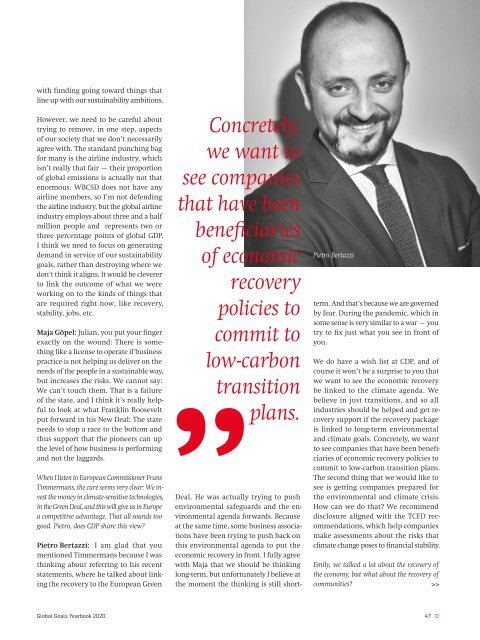Planet under Pressure
The 2020s are the make-or-break decade for Sustainability. But Covid-19 questions almost everything. How can we handle increasingly frequent shocks? What can a resilient society and economy that is in line with planetary boundaries look like? These and many other questions are discussed in the new 2020 edition of the Global Goals Yearbook titled “Planet under Pressure”. The Yearbook supports the UN Sustainable Development Goals and is one of the publications in strong international demand.
The 2020s are the make-or-break decade for Sustainability. But Covid-19 questions almost everything. How can we handle increasingly frequent shocks? What can a resilient society and economy that is in line with planetary boundaries look like? These and many other questions are discussed in the new 2020 edition of the Global Goals Yearbook titled “Planet under Pressure”. The Yearbook supports the UN Sustainable Development Goals and is one of the publications in strong international demand.
Create successful ePaper yourself
Turn your PDF publications into a flip-book with our unique Google optimized e-Paper software.
ECONOMIC LESSONS<br />
with funding going toward things that<br />
line up with our sustainability ambitions.<br />
However, we need to be careful about<br />
trying to remove, in one step, aspects<br />
of our society that we don’t necessarily<br />
agree with. The standard punching bag<br />
for many is the airline industry, which<br />
isn’t really that fair – their proportion<br />
of global emissions is actually not that<br />
enormous. WBCSD does not have any<br />
airline members, so I’m not defending<br />
the airline industry, but the global airline<br />
industry employs about three and a half<br />
million people and represents two or<br />
three percentage points of global GDP.<br />
I think we need to focus on generating<br />
demand in service of our sustainability<br />
goals, rather than destroying where we<br />
don’t think it aligns. It would be cleverer<br />
to link the outcome of what we were<br />
working on to the kinds of things that<br />
are required right now, like recovery,<br />
stability, jobs, etc.<br />
Maja Göpel: Julian, you put your finger<br />
exactly on the wound: There is something<br />
like a license to operate if business<br />
practice is not helping us deliver on the<br />
needs of the people in a sustainable way,<br />
but increases the risks. We cannot say:<br />
We can’t touch them. That is a failure<br />
of the state, and I think it’s really helpful<br />
to look at what Franklin Roosevelt<br />
put forward in his New Deal: The state<br />
needs to stop a race to the bottom and<br />
thus support that the pioneers can up<br />
the level of how business is performing<br />
and not the laggards.<br />
When I listen to European Commissioner Frans<br />
Timmermans, the cure seems very clear: We invest<br />
the money in climate-sensitive technologies,<br />
in the Green Deal, and this will give us in Europe<br />
a competitive advantage. That all sounds too<br />
good. Pietro, does CDP share this view?<br />
Pietro Bertazzi: I am glad that you<br />
mentioned Timmermans because I was<br />
thinking about referring to his recent<br />
statements, where he talked about linking<br />
the recovery to the European Green<br />
Concretely,<br />
we want to<br />
see companies<br />
that have been<br />
beneficiaries<br />
of economic<br />
recovery<br />
policies to<br />
commit to<br />
low-carbon<br />
transition<br />
plans.<br />
Pietro Bertazzi<br />
”<br />
Deal. He was actually trying to push<br />
environmental safeguards and the environmental<br />
agenda forwards. Because<br />
at the same time, some business associations<br />
have been trying to push back on<br />
this environmental agenda to put the<br />
economic recovery in front. I fully agree<br />
with Maja that we should be thinking<br />
long-term, but unfortunately I believe at<br />
the moment the thinking is still shortterm.<br />
And that’s because we are governed<br />
by fear. During the pandemic, which in<br />
some sense is very similar to a war – you<br />
try to fix just what you see in front of<br />
you.<br />
We do have a wish list at CDP, and of<br />
course it won’t be a surprise to you that<br />
we want to see the economic recovery<br />
be linked to the climate agenda. We<br />
believe in just transitions, and so all<br />
industries should be helped and get recovery<br />
support if the recovery package<br />
is linked to long-term environmental<br />
and climate goals. Concretely, we want<br />
to see companies that have been beneficiaries<br />
of economic recovery policies to<br />
commit to low-carbon transition plans.<br />
The second thing that we would like to<br />
see is getting companies prepared for<br />
the environmental and climate crisis.<br />
How can we do that? We recommend<br />
disclosure aligned with the TCFD recommendations,<br />
which help companies<br />
make assessments about the risks that<br />
climate change poses to financial stability.<br />
Emily, we talked a lot about the recovery of<br />
the economy, but what about the recovery of<br />
communities? >><br />
Global Goals Yearbook 2020<br />
47
















